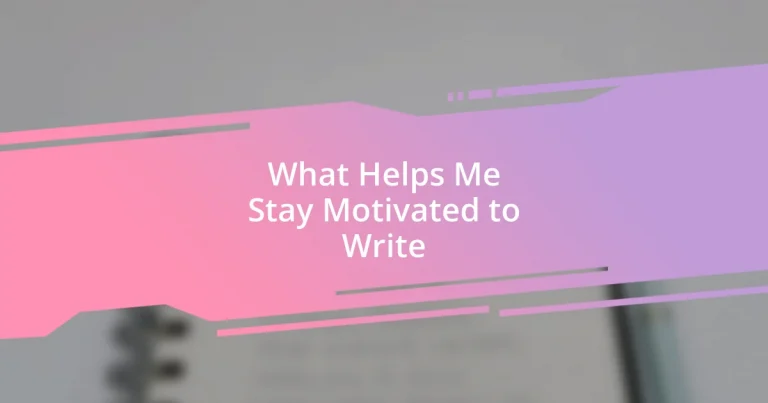Key takeaways:
- Setting clear writing goals and breaking them into smaller tasks can reignite passion and motivation, making the writing process feel more manageable.
- Creating a dedicated writing routine and comfortable workspace enhances creativity and productivity, while incorporating rituals can prepare the mind for focused writing.
- Building a supportive writing community through workshops and groups fosters encouragement, accountability, and collaboration, significantly enriching the writing journey.

Understanding My Writing Goals
Understanding my writing goals is like charting a course before a journey. For instance, when I set out to write my first novel, I envisioned a world that was both familiar and fantastical. I had to ask myself: What stories do I want to tell? This reflection not only shaped my narrative but also fueled my desire to write every day.
I remember feeling overwhelmed at times, grappling with whether I was aiming too high or not high enough. I often revisited my goals, breaking them down into smaller tasks, like finishing a chapter or even a paragraph. It’s astonishing how checking off these smaller milestones can reignite my passion for writing—each completed task feels like a little victory.
As I reflect on my journey, I realize that my goals aren’t just about product; they’re deeply personal and emotional. Writing has become a medium through which I explore my thoughts and feelings. How does your writing reflect your own aspirations? For me, every word on the page brings me closer to understanding myself and the world around me.
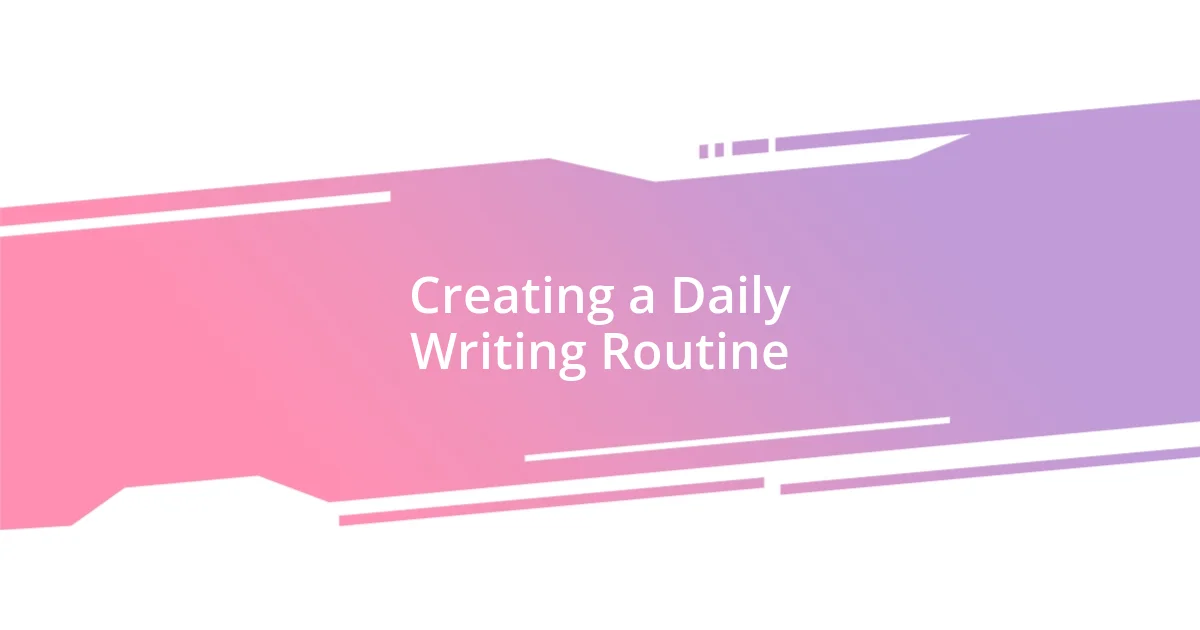
Creating a Daily Writing Routine
Creating a daily writing routine has been transformative for my creative process. I’ve found that setting a particular time each day to write—whether it’s early morning or late at night—helps me cultivate a habit. Initially, I struggled to stick to it, often finding excuses about being too tired or busy, but soon I realized that a dedicated time frame carved out my day for focused writing.
I also discovered the power of a writing space. It didn’t have to be a quiet library or a fancy office; sometimes, it was just my cozy corner at home with a mug of tea. Surrounding myself with items that inspire creativity—like quotes, books, or even a plant—made my writing sessions something I genuinely looked forward to. I recall a time when I decorated my desk with mementos from my travels, and each piece sparked a story or memory, making the writing process feel like a delightful adventure.
Implementing small rituals before I begin writing has also become essential. Whether it’s a few deep breaths, some light stretching, or listening to a particular song, these moments signal to my mind that it’s time to create. I’ve even started journaling briefly to clear my thoughts, which makes my writing time feel more purposeful. Have you tried incorporating any routines into your writing practice? I’ve found that these little steps can profoundly impact productivity and joy in writing.
| Aspect | Importance |
|---|---|
| Dedicated Time | Helps to build a habit and reduces distractions. |
| Writing Space | Inspires creativity and fosters a positive writing environment. |
| Pre-Writing Rituals | Prepares the mind for focused creativity and increases productivity. |

Finding Inspiration from Surroundings
Finding inspiration in my surroundings has always been a treasure trove for my creativity. I recall one chilly autumn afternoon when I took a walk through a local park, surrounded by the vibrant hues of falling leaves. Each rustle of the wind and the laughter of children inspired vivid scenes that I later incorporated into my writing. It reminded me that sometimes, stepping outside can lead to some of the most unexpected bursts of creativity.
- Nature walks can clear my mind and spark new ideas, making it easier to overcome writer’s block.
- Art and architecture around me often influence the settings and characters I create, enriching my narratives.
- Listening to conversations in cafés can unveil genuine dialogue ideas for characters, making them feel more real.
My environment often holds stories waiting to be uncovered. During a recent visit to a bustling marketplace, I overheard a fascinating interaction between vendors—this fleeting moment ignited the premise for a short story. It’s remarkable how something as simple as a vibrant setting or an engaging conversation can provide a wellspring of inspiration. I believe that if we open our eyes and ears to the world around us, we’ll discover endless stories just waiting to be told.

Setting Up a Comfortable Workspace
Setting up a comfortable workspace is essential for nurturing my creativity. I remember the first time I created a dedicated writing spot in my apartment. I cleared away the clutter and added items that made me smile—my favorite mug, a scented candle, and a comfy chair. This small transformation made writing feel less like a chore and more like a cozy escape where ideas could flow freely.
Lighting plays a crucial role in how I feel while writing. There was a period when I struggled with a harsh overhead light that felt sterile. Switching to soft lamps and warm-toned bulbs made a significant difference. It’s amazing how the right lighting can create a calming atmosphere, making you want to settle in and lose track of time in your thoughts. Have you considered how your lighting affects your mood?
I also like to personalize my workspace with inspiration. For me, it means pinning up photos or quotes that resonate deeply, often reminding me of reasons I began writing. One day, I hung a snapshot from a writing retreat I attended. Each glance at it stirs up memories of connection and creativity, reigniting that initial spark every time I sit down to write. The environment we create can have such a profound impact; how does yours inspire you?
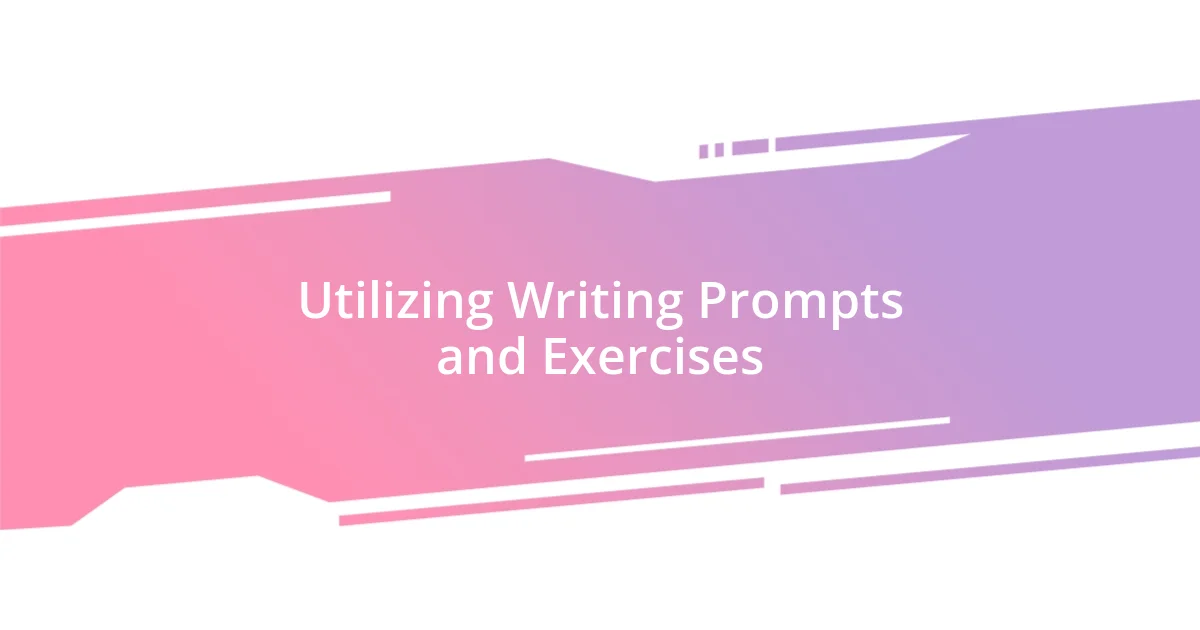
Utilizing Writing Prompts and Exercises
Utilizing writing prompts has been a game changer for me. I remember attending a workshop where the instructor handed out slip after slip of intriguing scenarios—like “a letter from a time traveler” or “an argument between inanimate objects.” Each prompt felt like a doorway, inviting me to step into a new narrative. I found that even the simplest suggestion could provoke my imagination in ways I never anticipated. Have you ever felt the power of a single phrase transforming your entire approach to writing?
Another effective exercise I enjoy is free writing. I often set a timer for ten minutes and just let my thoughts spill onto the page without worrying about grammar or structure. The freedom in those moments reveals ideas that might remain hidden otherwise. I distinctly recall one session where my pen barely lifted from the paper; I ended up with an unexpected poem about the ocean, something I hadn’t planned at all. It’s intriguing how releasing the pressure of perfection can unlock creativity. Have you tried this technique to discover your voice?
Incorporating specific exercises, like character sketches, has also enhanced my storytelling. I dedicate time to flesh out characters’ backgrounds, quirks, and desires, almost like they’re old friends I’m getting to know. I was surprised when one character—initially just a side note—developed into a driving force in my narrative. This not only deepens my writing but offers an insightful lens into the complexities of human nature. What exercises do you find most effective for diving deeper into your characters?
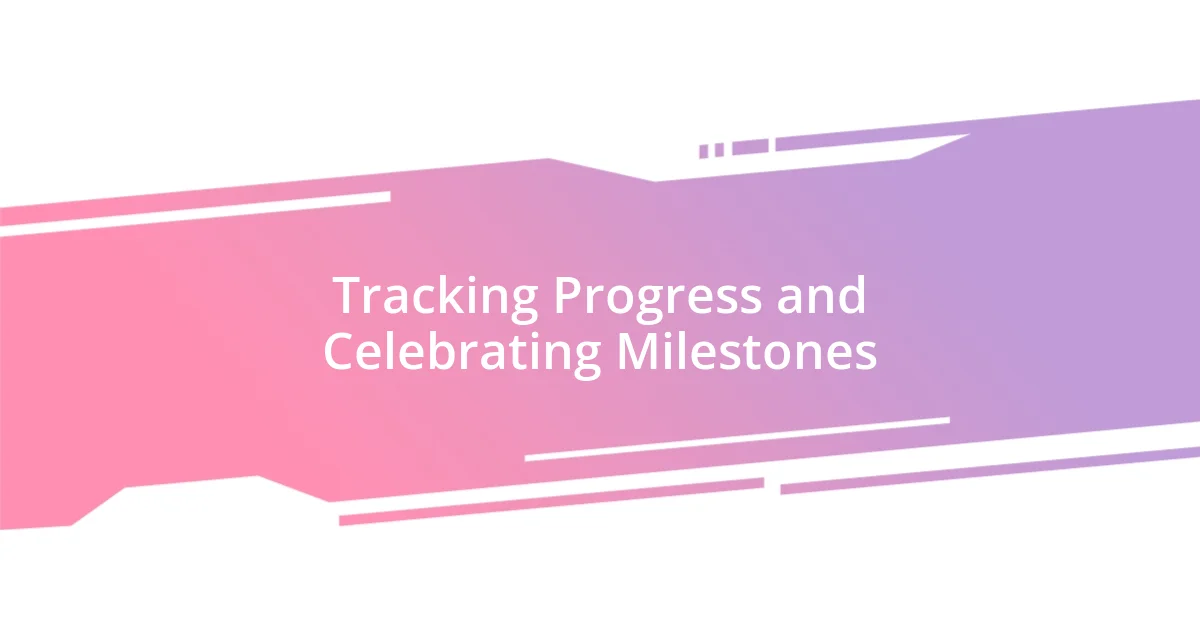
Tracking Progress and Celebrating Milestones
Tracking my progress in writing has become a key motivating factor for me. I like to maintain a journal where I log my daily word counts and jot down thoughts about what inspired me that day. When I glance back at my entries, I’m often surprised at how much I’ve accomplished. Have you ever looked back at your work and felt pride in your own growth? For me, each entry serves as a gentle reminder of my dedication, pushing me to keep going.
Celebrating milestones, no matter how small, is essential to my writing journey. Recently, I reached the halfway point of my book, and instead of simply marking it on my calendar, I treated myself to a small celebration. I baked a batch of cookies, danced around my kitchen, and even shared the news with friends. It felt rewarding to acknowledge my hard work—don’t you think we all deserve those moments of joy along the way?
I also find that visual trackers, like a progress chart, keep me engaged. I created a simple chart on the wall that maps my project’s stages, filling in colors as I complete each section. Watching those colors accumulate brings a burst of satisfaction that ordinary numbers just don’t do. Isn’t it fascinating how a visual can keep the motivation alive? That image of progress hanging right before me is a constant push to write a little more each day.
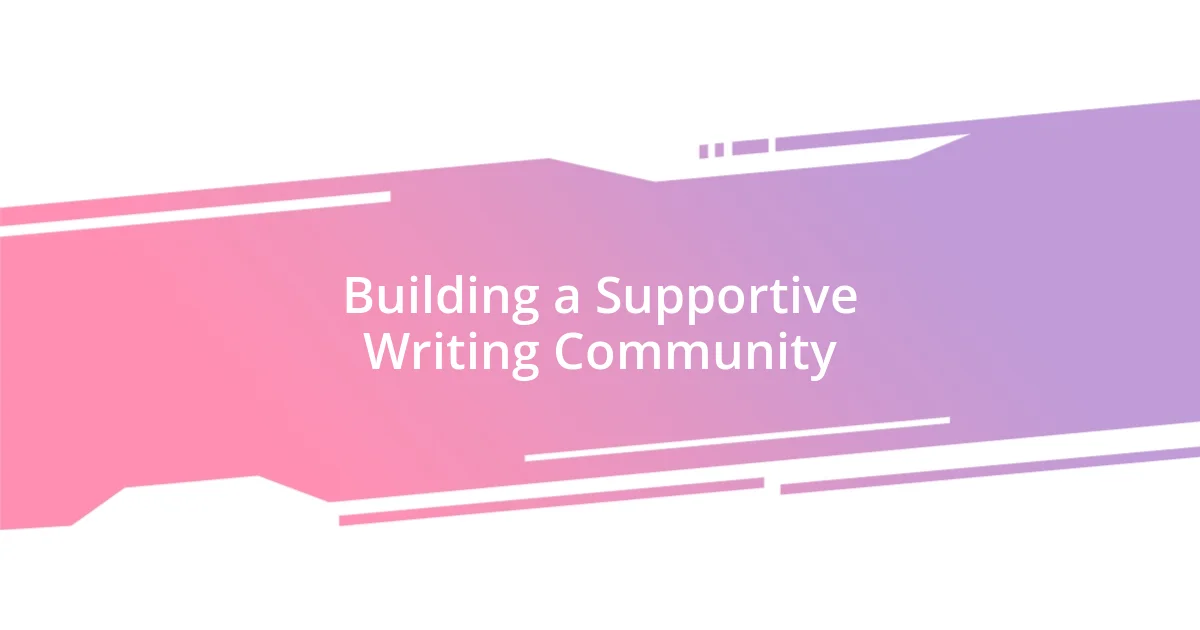
Building a Supportive Writing Community
Building a supportive writing community has been transformative in my journey as a writer. I recall joining an online forum where fellow writers shared their pieces and offered feedback. The sense of camaraderie was palpable; we were all navigating similar struggles. It was comforting to know that my voice mattered, and their constructive criticism didn’t just enhance my writing—it fortified my confidence. Have you ever experienced that exhilarating moment of gaining insights from someone who truly understands your journey?
I find that regular check-ins with writing groups provide an instant boost when motivation wanes. For instance, in one group I’m part of, we set weekly goals and discuss our progress. That gentle accountability keeps me on track, and the encouragement I receive is genuine. I remember one week when I was stuck; sharing my challenges led to invaluable suggestions from my peers. Isn’t it amazing how a simple conversation can spark fresh ideas?
Additionally, participating in local writing workshops has deepened my connection with the craft. I often leave these sessions feeling inspired and energized, like I’m part of something bigger. There’s a certain magic in sharing experiences, whether it’s celebrating breakthroughs or empathizing over writer’s block. I recently attended a workshop where we collaborated on a short story, and I was surprised by how our different perspectives wove together seamlessly. How often do we overlook the power of collaboration to ignite our creativity?












